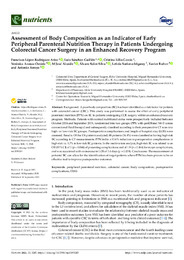Por favor, use este identificador para citar o enlazar este ítem:
https://hdl.handle.net/11000/31123Registro completo de metadatos
| Campo DC | Valor | Lengua/Idioma |
|---|---|---|
| dc.contributor.author | López Rodríguez -Arias, Francisco | - |
| dc.contributor.author | Sánchez-Guillén, Luis | - |
| dc.contributor.author | Lillo García, Cristina | - |
| dc.contributor.author | ARANAZ OSTÁRIZ, VERÓNICA | - |
| dc.contributor.author | Alcaide, M. José | - |
| dc.contributor.author | Soler-Silva, Álvaro | - |
| dc.contributor.author | SORIANO-IRIGARAY, LETICIA | - |
| dc.contributor.author | Barber, Xavier | - |
| dc.contributor.author | Arroyo-Sebastián, Antonio | - |
| dc.contributor.other | Departamentos de la UMH::Patología y Cirugía | es_ES |
| dc.date.accessioned | 2024-02-05T18:49:55Z | - |
| dc.date.available | 2024-02-05T18:49:55Z | - |
| dc.date.created | 2021-09-18 | - |
| dc.identifier.citation | Nutrients 2021, 13(9), 3245 | es_ES |
| dc.identifier.issn | 2072-6643 | - |
| dc.identifier.uri | https://hdl.handle.net/11000/31123 | - |
| dc.description.abstract | Background: A poor body composition (BC) has been identified as a risk factor for patients with colorectal cancer (CRC). This study was performed to assess the effect of early peripheral parenteral nutrition (PPN) on BC in patients undergoing CCR surgery within an enhanced recovery program. Methods: Patients with normal nutritional status were prospectively included between October 2016 and September 2019, randomized into two groups (PPN with periOlimel N4-E versus conventional fluid therapy) and subsequently classified according to their preoperative CT scan into high- or low-risk BC groups. Postoperative complications and length of hospital stay (LOS) were assessed. Results: Of the 156 patients analyzed, 88 patients (56.4%) were classified as having high-risk BC according to CT measurements. PPN led to a 15.4% reduction in postoperative complications in high-risk vs. 1.7% in low-risk BC patients. In the multivariate analysis, high-risk BC was related to an OR (95% CI) of 2 (p = 0.044) of presenting complications and of 1.9 (p = 0.066) for major complications, and was associated with an increase in LOS of 3.6 days (p = 0.039). Conclusions: The measurement of patients’ BC can allow for the identification of target patients where PPN has been proven to be an effective tool to improve postoperative outcomes. | es_ES |
| dc.format | application/pdf | es_ES |
| dc.format.extent | 13 | es_ES |
| dc.language.iso | eng | es_ES |
| dc.publisher | MDPI | es_ES |
| dc.rights | info:eu-repo/semantics/openAccess | es_ES |
| dc.rights.uri | http://creativecommons.org/licenses/by-nc-nd/4.0/ | * |
| dc.subject | peripheral parenteral nutrition | es_ES |
| dc.subject | colorectal cancer | es_ES |
| dc.subject | body composition | es_ES |
| dc.subject | postoperative complications | es_ES |
| dc.subject | ERAS | es_ES |
| dc.subject.other | CDU::6 - Ciencias aplicadas::61 - Medicina::616 - Patología. Medicina clínica. Oncología | es_ES |
| dc.title | Assessment of Body Composition as an Indicator of Early Peripheral Parenteral Nutrition Therapy in Patients Undergoing Colorectal Cancer Surgery in an Enhanced Recovery Program | es_ES |
| dc.type | info:eu-repo/semantics/article | es_ES |
| dc.relation.publisherversion | https://doi.org/10.3390/nu13093245 | es_ES |

Ver/Abrir:
Assessment of Body Composition as an Indicator of Early.pdf
2,13 MB
Adobe PDF
Compartir:
 La licencia se describe como: Atribución-NonComercial-NoDerivada 4.0 Internacional.
La licencia se describe como: Atribución-NonComercial-NoDerivada 4.0 Internacional.
.png)